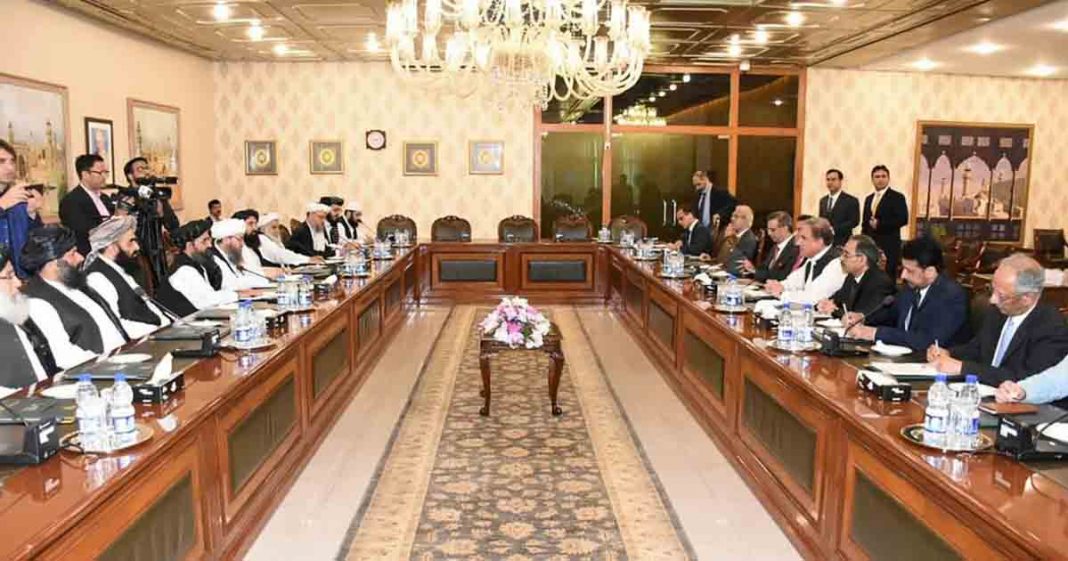Pakistan’s special representative for Afghanistan this week held talks with the Taliban’s Doha-based leadership to discuss the peace and reconciliation process in war-battered Afghanistan, the Foreign Ministry said on Friday.
Muhammad Sadiq Khan paid a two-day visit to Doha on June 16-17 to meet the Taliban leaders, including their chief negotiator, Mullah Abdul Ghani Baradar, Foreign Ministry spokeswoman Aisha Farooqui said in a statement.
Taliban peace talks held with Pakistan envoy
“The special representative underlined that Pakistan will continue to play its role as facilitator for peace and reconciliation in Afghanistan. In this context, he referred to the highly productive visit of the chief of Army Staff to Kabul recently, which had imparted a new impetus to Pakistan’s efforts,” the statement said.
Islamabad earlier this month named Khan its envoy to Afghanistan amid efforts to start intra-Afghan negotiations aimed at ending Washington’s longest war in neighboring Afghanistan.
Pakistan appointed a senior diplomat as its special ambassador to Afghanistan following spearheaded efforts to start intra-Afghan negotiations aimed at ending Washington’s longest war in neighboring Afghanistan.
Read more: Pakistan appoints Sadiq Khan as ambassador to Afghanistan
His appointment coincides with desperate attempts from Islamabad’s longtime ally, Washington, to court the warring Taliban to hold direct talks with Kabul government — a key component of a peace deal struck between the US and the Taliban.
Khan, Pakistan’s envoy to Afghanistan from 2008 to 2014, said he “appreciated” the Taliban’s commitment to implement the historic peace deal struck between the US and the Taliban in February.
Both sides have taken positive & encouraging steps to begin the Intra-Afghan negotiations. The violence has reduced, & the process of prisoner release continues. The Islamic Republic of Afghanistan is committed to complete the release of Taliban prisoners. 1/2
— Dr Mujib Rahman Rahimi (@MujibRahimi) June 12, 2020
Pakistan involved in intra-Afghan peace process
Hailing the release of prisoners by the two sides as per the peace agreement, Khan said it would be “a stepping stone towards the immediate start of Intra-Afghan negotiations”.
“Pakistan hopes that all concerned parties will make sincere efforts for peace and reconciliation in Afghanistan. Pakistan, for its part, remains fully committed to support the Afghan peace process,” the statement said.
Ahead of crucial intra-Afghan talks between the Taliban and Afghan government, Pakistan’s military and intelligence chiefs landed in Kabul on an unannounced visit in early June, officials confirmed.
Read more: Afghan government and Taliban talks to begin; Pakistan to attend
According to the Embassy of Pakistan in Kabul, Chief of the Army Staff Gen. Qamar Javed Bajwa and head of the Inter-Services Intelligence Lt. Gen. Faiz Hameed met Afghan President Ashraf Ghani at the presidential palace.
The United States Afghan peace envoy and Pakistan’s army chief have held talks to discuss the commencement of a peace process between the Afghan government and the Taliban, according to a statement, as violence has recommenced after a brief ceasefire was announced a few weeks ago.
US Special Representative for Afghan Reconciliation Zalmay Khalilzad met with Pakistani army chief General Qamar Javed Bajwa in Islamabad in June, the US and Pakistan’s military said in separate statements.
Pakistan’s role in US-Taliban peace talks
In December 2018, Pakistan arranged rare direct talks between Washington and the Taliban, paving the way for the Doha peace deal between the two sides.
Pakistan also facilitated the landmark first round of direct talks between the Afghan government and the Taliban in Islamabad in July 2015. That process broke down after the Taliban announced the death of their long-time leader Mullah Omar, triggering a bitter internal power struggle.
With the help of Pakistan, both parties have come to the agreement that the US will withdraw troops from Afghanistan. The United States and its allies will withdraw all their forces from Afghanistan within 14 months if the Taliban abide by an agreement signed in Doha in February.
“Pakistan has been very consistent about the Taliban. Right after September 11, Pakistan kept telling Americans that there is a difference between the Taliban and Al Qaeda. We must talk to the Taliban,” said Kamal Alam, a military analyst.
As explain in an op-ed written for Global Village Space, the Afghan government released hundreds of Taliban prisoners on 27th May 2020, its single largest prisoner release since the U.S. and the Taliban signed a peace deal earlier this year that spells out an exchange of detainees between the warring sides. The Taliban have also released about 300 hostages.
Read more: The rocky road of US-Taliban peace agreement
The prisoner release is part of the U.S. deal with the Taliban, signed on Feb. 29, to allow for the eventual withdrawal of U.S. and NATO troops from Afghanistan, bringing to an end the country’s protracted war and America’s longest military involvement. The rest of the exchange has come to a halt over disagreements about its terms. The Taliban say that the release of all detainees on their list is a pre-condition for intra-Afghan peace talks. They accuse Kabul of deliberate delay and demand the immediate release of the prisoners because of Covid-19.
(1/4) Prisoner releases have reached a new milestone. We welcome the government now having exceeded 3000 Talib prisoners released and the Taliban 500+. It is important that the process continues and the prisoners release roadblock resolved.
— US4AfghanPeace (@US4AfghanPeace) June 11, 2020
Anadolu with additional input by GVS News Desk
What are your views on this? Share with us in the comments bar below.














